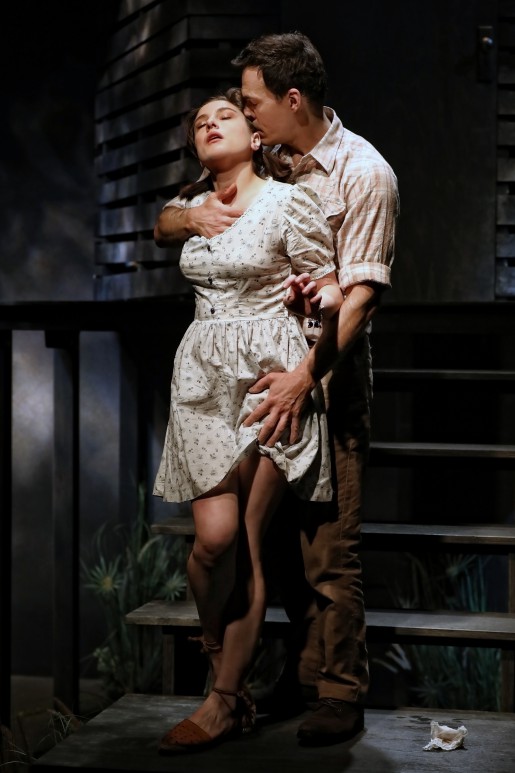Ensemble Theatre, October 23
7.5/10
Sometimes just as you think you’ve failed to light a fire, it suddenly flares up. This production is like that. It flickers and hisses and fizzes for a while, and then the key kindling, desire and arousal, catch alight, and the play begins to burn. As gas and wood have different flames, this generates different heat from the 1956 film upon which it’s based. While that smouldered from the start (thanks to Carroll Baker’s performance in the titular role), the censors of the day damped down any chance of an inferno. This version skips the sultry and smouldering phases, to burst from nothing into blazing lust.

To evade a ban, film director Elia Kazan disguised the sizzling sexual tension in Tennessee Williams’ screenplay with B-grade comedy, resulting in a weird tonality of trying to be two things at once. Fast forward to now, and director Shaun Rennie had to unravel other complications in presenting this 2015 stage adaption of Williams’ screenplay, penned by Pierre Laville and Emily Mann. Rennie didn’t need to fear the prude police, but he did need to tread warily in how this childlike, 19-year-old virgin wife in 1950s Mississippi might appear through a contemporary feminist lens. He and actor Kate Cheel (Baby Doll) have arrived at a performance that, at its best, has sparks flying, and is perched on the edge of something even better.
What they haven’t managed is to make the character more engaging and less dim before her sexual awakening. Where Baker found a way to be both juvenile and radioactive, Cheel settles for petulance in her early exchanges with Jamie Oxenbould. He, playing her husband, Archie Lee, excels in layering pathos into this flabby, aging, sweaty, boozy loser, who just happens to have lucked into snapping up the prize of Baby Doll before her pappy died.

Enter the younger, more attractive Silva Vacarro, whose efficient cotton gin has pinched all Archie’s business. When Archie burns down Silva’s operation, the latter brings his cotton to Archie for ginning, while prowling for evidence of arson. In the film Elli Wallach played Silva as a comic villain who was almost likely to twirl his moustaches and wink at the camera. Socratis Otto makes him a much more credible catalyst for Baby Doll’s sexual awakening. Rather than leering at her, he is alive to her needs. It is she who propositions, and he who obliges, opening her mind to a world infinitely wider than life with Archie in a remote, ramshackle house.
Perhaps Rennie and Cheel intentionally toned down Baby Doll’s allure at the start to create a trajectory like a chrysalis opening, but more of a flicker of her capacity to manipulate might have been suggested, even within the patriarchal rules. Once Silva is caressing her skin and flicking at her with his symbol-laden riding-crop, however, Cheel is superb: flinching in alarm and melting with desire simultaneously.
Maggie Dence is delightful as Baby Doll’s one true friend, her fading Aunt Rose Comfort, whose expertise is scoffing other people’s chocolate. By the end, despite Baby Doll’s surge into a universe where pleasure can compensate for pain, the two women are still left hanging by a thread on the decision of a man.
Constrained by space, Rennie and designer Anna Tregloan have abstracted the mansion setting, yet the existing visual elements ooze sweat like a pore, and Rennie has cleverly solved staging conundrums by choreographing some scenes with voice-overs, although these could still be tightened. Nate Edmondson’s score, meanwhile, is brilliantly evocative.
Until November 16.